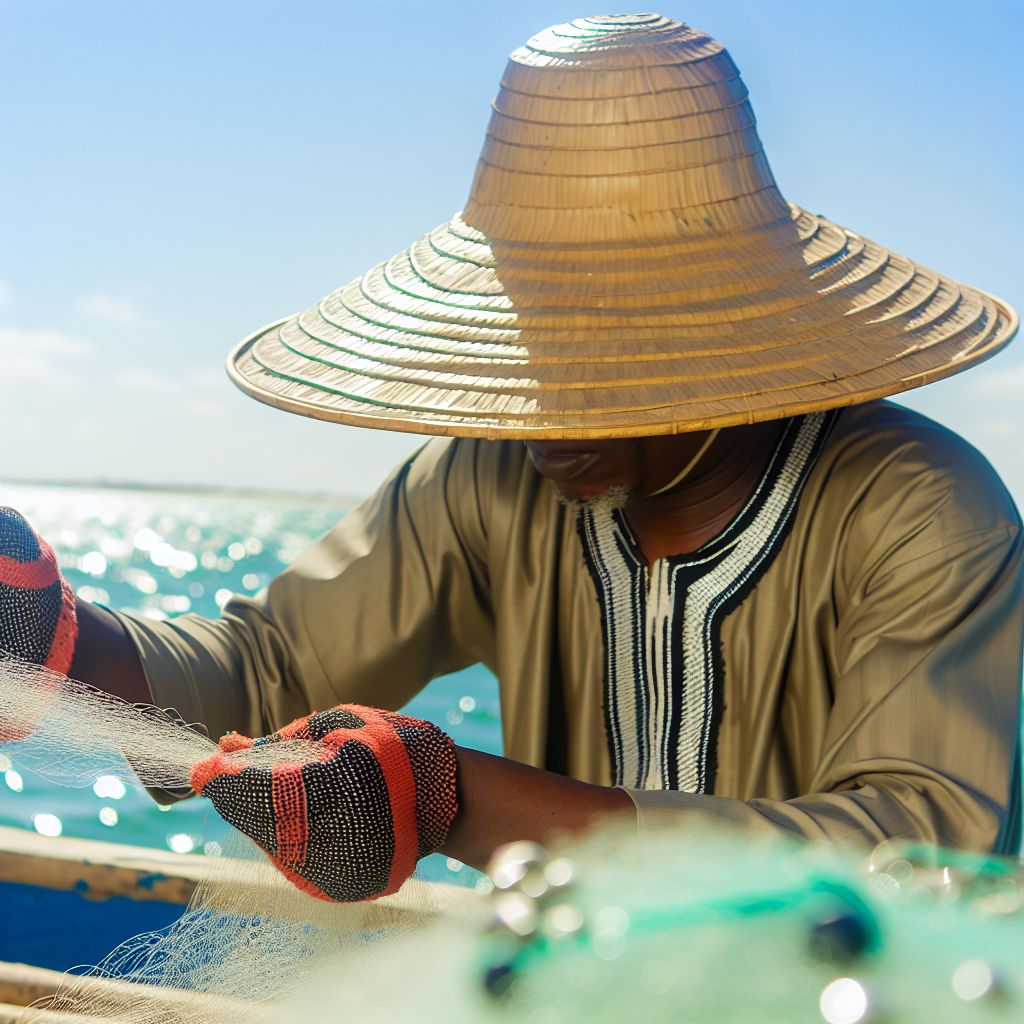Introduction:
Fisheries play a crucial role in Nigeria’s economy.
They provide food security and employment opportunities.
The Nigerian government has taken significant steps to support and promote the fisheries sector in the country.
Government Policies and Programs
The government has implemented policies to regulate fishing activities and protect marine resources.
Programs such as the Agriculture Transformation Agenda focus on improving fish farming practices.
Infrastructure Development
The government invests in building infrastructure like fish landing sites and cold storage facilities.
These developments help fishers to preserve their products and access larger markets.
Training and Capacity Building
Training programs are available to educate fishers on sustainable fishing methods and best practices.
Capacity building initiatives aim to enhance the skills of fishermen and women in the sector.
Financial Support
The government provides financial support through grants and loans to encourage investment in fisheries.
This funding helps fisherfolk to purchase equipment, expand their operations, and improve productivity.
Research and Development
The government funds research initiatives to improve breeding techniques, reduce post-harvest losses, and enhance fish quality.
Investment in research and development ensures continuous innovation in the fisheries sector.
The Nigerian government’s support for fisheries is crucial for the sector’s growth and sustainability.
History of Government Support for Fisheries in Nigeria
Government support for fisheries in Nigeria has a long history.
Various initiatives and policies aimed at developing and sustaining the industry have been implemented.
Overview of Past Initiatives and Policies
- Establishment of fisheries departments in different states.
- Introduction of fishery development programs and projects.
- Provision of training and extension services to fisherfolk.
- Implementation of policies to regulate fishing activities.
- Creation of fishery cooperatives to enhance collective action.
These initiatives were designed to improve the livelihoods of fisherfolk.
They aimed to increase fish production and boost the overall economy.
Impact of Previous Support on the Growth of the Sector
- Increased fish production and availability in local markets.
- Enhanced skills and knowledge among fisherfolk.
- Improved access to credit and financial resources.
- Strengthened regulatory frameworks for sustainable fishing practices.
- Promotion of value addition and marketing strategies for fish products.
The support provided by the government has contributed significantly to the growth of the fisheries sector in Nigeria.
Continuous efforts are needed to address current challenges and maximize the sector’s potential.
Current government interventions in fisheries:
The Nigerian government has various programs in place to support the fisheries sector.
One such program is the Fisheries Development and Training Center which provides training.
The government also offers subsidies to fisherfolks to encourage sustainable fishing practices.
These subsidies can include financial assistance for purchasing equipment or improving fishing techniques.
Additionally, there are grants available for small-scale fishermen to enhance their operations.
The government aims to promote sustainable fishing practices through these interventions.
By providing support to fisherfolks, the government helps in ensuring the long-term viability of the sector.
These interventions are crucial for maintaining fish stock levels and protecting marine ecosystems.
The government’s efforts help to prevent overfishing and promote responsible fishing activities.
Through these programs, fisherfolks are educated on the importance of conservation and sustainable practices.
Analysis of the effectiveness of these interventions:
The existing programs, subsidies, and grants have had a positive impact on the fisheries sector.
Many fisherfolks have benefited from the training offered by the Fisheries Development and Training Center.
This has resulted in improved skills and knowledge among fishermen, leading to increased productivity.
The subsidies provided by the government have helped fisherfolks invest in better equipment.
As a result, they can fish more efficiently and sustainably, without harming the environment.
The grants available to small-scale fishermen have enabled them to expand their operations.
This has boosted their incomes and livelihoods, contributing to poverty reduction.
Overall, these interventions have played a significant role in promoting sustainable fishing practices.
They have helped in increasing fish stock levels and protecting the marine ecosystem.
The government’s support has also led to a more organized and regulated fishing industry.
Transform Your Career with Expert Guidance
Get personalized mentorship consulting that’s tailored to your unique path. Our expert advice is actionable and exclusive.
Get StartedThe Nigerian government’s support for fisheries through various interventions has been crucial in promoting sustainable fishing practices.
These initiatives have had a positive impact on fisherfolks, helping them improve their skills, invest in better equipment, and expand their operations.
The government’s efforts have not only boosted the productivity of the fisheries sector but also contributed to environmental conservation and poverty reduction.
It is essential for the government to continue and expand these interventions to ensure the long-term sustainability of the fisheries sector in Nigeria.
Gain More Insights: Role of Government in Environmental Safety Management
Infrastructure development and modernization:
Improving infrastructure in fishing communities is a key focus of the Nigerian government’s support for fisheries.
Efforts have been made to enhance facilities such as landing sites, processing plants, and storage facilities.
By upgrading infrastructure, the government aims to create a conducive environment for fisherfolk to operate efficiently.
Access to better facilities can lead to increased productivity and higher quality fish products.
Modernization efforts include the use of technology in fishing practices, such as GPS systems for navigation.
Improvements in infrastructure can attract more investment in the fisheries sector, boosting profitability.
Efficient infrastructure can also reduce post-harvest losses, ensuring that more fish reaches the market.
Training programs are offered to fisherfolk to help them adapt to modern techniques and equipment.
The government is working towards creating a sustainable and competitive fishing industry through infrastructure development.
Modernization can also help in meeting international standards for fish exports, expanding market opportunities.
See Related Content: Environmental Impact of Oil Industry in Nigeria
Examination of the Laws and Regulations Governing Fisheries in Nigeria
The Nigerian government has put in place a number of laws and regulations that govern the country’s fisheries sector.
These include the Fisheries Act, which provides a legal framework for the management and regulation of fisheries activities in the country.
The act covers a wide range of issues, including licensing, registration, conservation, and enforcement measures.
In addition to the Fisheries Act, there are also other laws and regulations that impact the fisheries sector in Nigeria.
For example, the Environmental Impact Assessment Act requires that any project that may have a significant impact on the environment, including fisheries activities, must undergo an assessment to determine potential environmental effects.
By examining these laws and regulations, it becomes clear that the Nigerian government takes the management of fisheries seriously.
It has put in place a comprehensive legal framework to ensure the sector operates in a sustainable and responsible manner.
Evaluation of the Government’s Role in Ensuring Compliance with Environmental and Sustainability Standards
One of the key roles of the Nigerian government in supporting fisheries is to ensure compliance with environmental and sustainability standards.
This involves monitoring and enforcing laws and regulations related to fisheries.
The government implements measures to protect marine resources and ecosystems.
The government plays a crucial role in monitoring and regulating fishing activities.
This includes licensing and registration of fishing vessels, monitoring of catches, and enforcement of conservation measures.
By doing so, the government helps to ensure that fisheries are managed in a sustainable manner.
It ensures that resources are not overexploited.
In addition to monitoring and enforcement, the Nigerian government also promotes sustainable practices within the fisheries sector.
This includes supporting initiatives to reduce bycatch, promote sustainable aquaculture practices, and protect marine habitats.
By working with industry stakeholders and environmental organizations, the government helps to ensure that fisheries in Nigeria are managed in a way that protects the environment.
It also supports the long-term viability of the sector.
You Might Also Like: Developing a Professional Portfolio in Estate Management

Capacity building and training programs:
Overview of educational and training initiatives targeted at fisherfolks.
The Nigerian government has implemented various programs to enhance the skills and capabilities of fisherfolks.
These initiatives include workshops, seminars, and vocational training aimed at improving their knowledge in fishing techniques.
The government collaborates with academic institutions, research centers, and industry experts to provide comprehensive training programs.
Fisherfolks are trained in modern fishing methods, equipment handling, fish processing, and marketing strategies.
Additionally, educational campaigns are conducted to raise awareness about sustainable practices and environmental conservation.
Assessment of the impact of these programs on skill development and capacity building in the fisheries sector.
The training programs have had a significant impact on skill development and capacity building in the fisheries sector.
Fisherfolks have reported a noticeable improvement in their fishing techniques and productivity after participating in these programs.
There has been an increase in the adoption of modern and sustainable fishing practices among trained fisherfolks.
Skills such as fish processing, preservation, and value addition have been enhanced, leading to better market opportunities for fisherfolks.
These initiatives have contributed to the growth and sustainability of the fisheries sector in Nigeria.
Gain More Insights: Estate Management and Property Valuation
Collaboration with International Partners
Description of Partnerships with International Organizations and Donor Agencies
Nigeria’s government has recognized the importance of collaboration with international partners to support the country’s fisheries sector.
Several partnerships have been established with international organizations such as the Food and Agriculture Organization (FAO), World Bank, and United Nations Development Program (UNDP).
These partnerships aim to enhance the sustainability and productivity of Nigeria’s fisheries industry by providing technical expertise, financial support, and capacity building initiatives.
One of the key partnerships is with the FAO, which has been instrumental in providing technical assistance to improve Nigeria’s fisheries management practices.
The FAO has supported the government in developing policies, regulations, and strategies to combat illegal fishing activities, promote sustainable aquaculture practices, and enhance fish stock assessment and monitoring systems.
Additionally, the FAO has assisted in capacity building programs for fisheries stakeholders, including fisherfolk, government officials, and researchers.
Another significant partnership is with the World Bank, which has funded various projects to modernize Nigeria’s fisheries infrastructure.
These projects include the construction of fish landing sites, cold storage facilities, and processing plants.
These investments have helped improve the value chain of Nigeria’s fisheries industry, leading to increased profitability for fisherfolk and improved access to high-quality fish products for consumers.
The collaboration with international donor agencies, such as the UNDP, has focused on promoting sustainable fishing practices.
It has also supported small-scale fisherfolk and enhanced the resilience of coastal communities to climate change impacts.
The UNDP has funded projects to strengthen community-based fisheries management initiatives, provide training on sustainable fishing techniques, and promote alternative livelihood options for fisherfolk in vulnerable areas.
Analysis of the Benefits and Challenges of Collaboration for the Nigerian Fisheries Industry
The partnerships with international organizations and donor agencies have brought numerous benefits to the Nigerian fisheries sector, including:
- Technical Support: The collaborations have provided access to valuable technical expertise and knowledge.
- Financial Assistance: The partnerships have facilitated the mobilization of financial resources for various projects.
- Capacity Building: The collaborations have enabled the training and capacity building of fisheries stakeholders.
However, there are also challenges associated with collaboration with international partners, such as:
- Dependency: Nigeria’s fisheries industry may become overly reliant on external support.
- Coordination: Ensuring effective coordination between the Nigerian government and its international partners can be complex.
- Policy Harmonization: The integration of international best practices into Nigeria’s fisheries policies may require adaptation.
Collaboration with international partners has played a crucial role in supporting the development of Nigeria’s fisheries industry.
It is essential for the government to strike a balance between leveraging external assistance and maintaining the sustainability of the sector.
By addressing the challenges and optimizing the benefits of collaboration, Nigeria can enhance the productivity and resilience of its fisheries industry for the benefit of all stakeholders.
Nigerian Fisheries Sector Support
The Nigerian government plays a crucial role in supporting the fisheries sector through various initiatives.
It is essential for the government to continue this support to ensure the growth and sustainability of the fisheries industry.
Government intervention is necessary to address challenges such as overfishing, lack of modern technology, and inadequate infrastructure.
By providing financial assistance, training programs, and policy frameworks, the government can help boost the productivity and efficiency of the fisheries sector.
Sustained government support is vital for the development of the fisheries sector in Nigeria, leading to economic growth and food security.
Additional Resources
Original research article Evaluating the Nigerian Government’s …
Sustaining the blue bounty: Fish food and nutrition security in …




